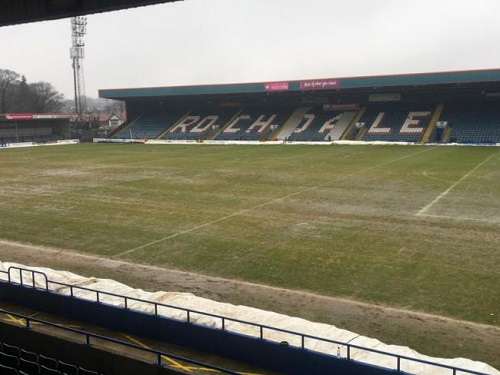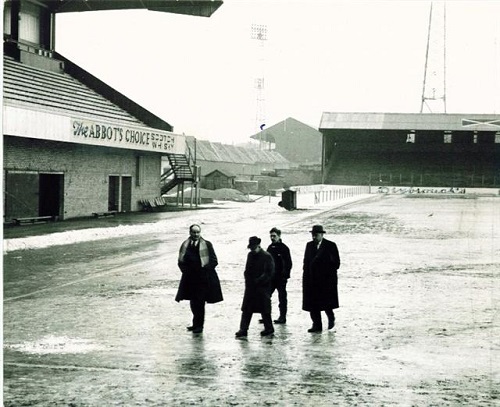Is it cold outside? Darren Young looks at what all the fuss is about…
Dangerous for players? Give us a break!
 Pitch Perfect is a perfectly good film. It’s not going to trouble The Godfather on the IMDB rankings any time soon, and its sequels have gradually diminished its impact but it’s nevertheless an enjoyable way to spend a Saturday evening.
Pitch Perfect is a perfectly good film. It’s not going to trouble The Godfather on the IMDB rankings any time soon, and its sequels have gradually diminished its impact but it’s nevertheless an enjoyable way to spend a Saturday evening.
Pitch perfect, however, isn’t a pre-requisite for the FA Cup on a Saturday or Sunday afternoon – quite the opposite in fact.
The pitch is supposed to be ‘a leveller’ in the cup. It should give the poor, little underdog a smidgen of a chance of holding their own against the big boys. Like the wind, the rain, tackles that take out Manchester City players at the knee, that kind of thing.
Back in the day, if a pitch had been subjected to incessant rainfall in the week leading up to a cup game where a lower league club were hosting a higher ranked opponent, they’d water the pitch again on the day of the match. It was one of the tricks that the smaller club, and canny groundsmen, had up their sleeves to unsettle the big time Charlies – and I don’t recall anyone like Ron Harris, Norman Hunter or later on, Graeme Souness, complaining about it.
That’s not to say I’m an advocate of waterlogged bogs and thinking we need to go back to the Ronnie Radford days of digging the ball out of the mud before shooting but if, with a few weeks of inclement weather, we get some pitches that – let’s say – aren’t at their best, then so be it.
Of course, I say this because in the last fortnight the spotlight has been on League One’s Rochdale, whose heavily sanded pitch ensured their game in the Fourth-Round v Millwall (they won 1-0 so well worth the effort) went ahead, despite several league match postponements before and after it.
They are re-laying the surface now in time for Harry Kane and Spurs to rock up on Sunday afternoon and manager Keith Hill said it will be as ‘perfect as it possibly can be’ for the tie, which almost certainly suits the Premier League team more than Rochdale.
But should it? I’d have personally liked to see Tottenham figure it out on the sand, the real magic of the cup, rather than carp to the media as Mauricio Pochettino did about player safety – which in itself is a bit insulting; as if Rochdale would put their own players in danger just to win a cup match. To be fair, he did say the safety of ‘both teams’ but we know who he was referring to.
Keith Hill thought the pitch comments were a bit of a cheap shot, and it did sound like getting your excuses in early. After all a team that can beat Real Madrid and Borussia Dortmund so convincingly and dominate Juventus in Turin surely has enough in the locker to beat Rochdale – pitch perfect or imperfect.

As a recent away fan at Rochdale, I’d say that they, cup magic aside, probably do need to replace the pitch, but for their own ends and not MoPo’s, as with so many cup games and cancelled fixtures they are now propping up the rest of the table with a mountain of games in hand.
And while we know that’s better than them being in the bush, they’ve still got to win a few to get out of trouble.
The EFL is known for its Saturday-Tuesday-Saturday grind, but not Saturday-Monday-Wednesday-Friday-Sunday as it might become if they aren’t careful.
The pitch issues are a timely topic given the Premier League let it be known last week that they are considering adding in a winter break in the future, putting them in line with the Bundesliga, La Liga and Serie A.
Of course, the break won’t affect the clubs outside of the top flight, so the likes of Rochdale wouldn’t avoid the problems with their pitch. But it also shows the difficulty in timing a winter break because in this country there is no guarantee of the worst weather hitting us in January, so it’s quite conceivable that we could have a two week break then, only to be hit with heavy snow in February.
But then, of course, a winter break has nothing to do with the weather.
The rationale is supposed to be the national team (although if this is a Premier League decision that will be as irrelevant as the weather) and also the impact of so many games on the health of players.
It’s an old chestnut and one with many facets. For instance, the fans don’t want to lose the packed roster of football over Christmas as it’s a sacred time for match watching. The broadcasters wouldn’t want it either. Manager’s meanwhile would take a break like a shot (or most of them, Arsene Wenger seems to be the exception but maybe he thinks that if the rest of the teams are in hibernation, his side might win a few more games after Christmas).
The impact on players is a debatable subject on its own.
In the early-eighties, Liverpool and Villa won a 42-game league with 13-14 players while they played cup games (domestic and European) as well. On those heavier pitches! But that’s not realistic these days as the game has got so much faster – as we keep hearing – and to be fair, the athleticism of players and the rule changes (i.e. goalkeepers not picking up pass backs) has meant the game has more of a continuous flow.
Gone are the days when after making a save, Peter Shilton could bounce the ball around his penalty area to give John Robertson just enough time to have a crafty fag on the half way line.
And as well as the benefits of a break for the England (and other home nations) team at major tournaments, what about the positive impact on English clubs in European competitions? For example, would our teams have a better chance of matching the likes of Barcelona and Bayern in the sharp end of the Champions League if they’d had a winter break too? Those against would say that it didn’t stop Chelsea in 2012.

“looks playable to me”
Although there are winter breaks and there are winter breaks. For example, Zenit St Petersburg are on a lengthy one that means that when they play Celtic in the Europa League Round of 32, they won’t have played since mid-December while their opponents have played eleven games in that time.
Of course, the winter break is also wide open to abuse with the concern that most PL sides would use the gap in the schedule to travel overseas to play lucrative friendlies.
As Chelsea have arranged a match in Australia a week after the World Cup Final, there does seem to be a lot of meat on that argument, and one that blows a hole in the player welfare strand.
As with anything in football, the real answer (although very unlikely to ever happen) lies in coordination. But football, and its authorities, rarely do anything that joins up.
For example, what about a mid-winter break for everyone (top flights only) at the same time? So, the leagues in Europe stop and start together. Heck, imagine also that the January transfer window is neatly aligned with it, so for two or three weeks, the players could put their feet up for a well-earned break while the club re-jigs it’s squad ready for the restart. Bit too sensible that, I fear.
And of course, the whole thing is, for now, is completely hypothetical. It’s very early days and I suspect the winter break leak was deliberately done as a way of testing the water of public opinion ahead of any future changes that can’t be made until at least 2022.
As it stands, the new (unimproved, domestically at least) TV deal means they’ll be nothing changing in the next three seasons at least as the packages on offer don’t include it.
But the clubs say they have discussed the possibility and some have agreed with a winter break in principle.
The rest said they were going to Dubai again like they did last year.


